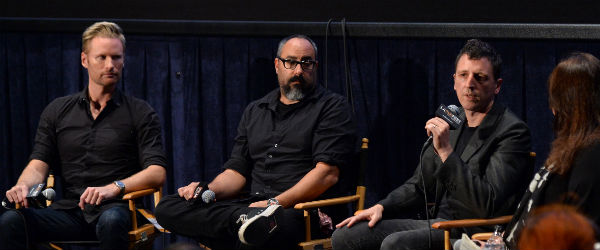LA Film Fest 2013: The Art of Music Composition & Tips to Get Started

“Music is changing pretty fast, and that’s great, that’s exciting.” Drew Sardy on the evolution of music and composition at this year’s Coffee Talks: Composers, sponsored by BMI.
By Wendy Chuong / LA Film Fest Guest Blogger
This year, the LA Film Fest brought together Brian Tyler, David Sardy and Atticus Ross to discuss their craft, changes in the industry and important tips on how to adapt to those changes in order to succeed as music composers. The first of several changes to music composition in the past decade: the relationship between composer and director.
Instead of stunted communication during spotting sessions, with the result often being much of the music left on the cutting room floor, Sardy explained, “my best experiences have been with directors who really actually have a vision for their characters.” He found a strong creative back and forth between a composer and director in spotting sessions to be substantially beneficial in deciding “the tone, the texture, the brightness, the darkness” of a film.
Tyler, composer of Iron Man 3, agreed with Sardy, adding that, “‘more flutes’ doesn’t help me at all.” What he discovered to be most rewarding is when directors are honest about what they like or dislike in a piece. Since composers have no control in the editing room about how scores are cut, it’s vital that the director works closely with the composer early on.
Such intimate relationships between composer and director have started to become the trend. Ross mentioned how, in his work for The Girl with the Dragon Tattoo, he was able to work closely with both director David Fincher and the sound designers in order to create something extraordinary, adding, “the score is the relationship between the director and composer.”
New Means of Production, New Styles of Music
Beyond the director-composer relationship, the second major change to music composition: the means of production, with the best example being the influence of sites like Beatport and new forms of music such as Trapstep. Sardy summed it up with, “it’s a weird time in music and a great time,” when the means of production have become so free and widely accessible.
Ross thought this leveling of the playing field to be good for the industry, but he believed these changes are ultimately unimportant because, “good work is good work.”
However, in order to produce great work alongside these production changes, Tyler advised budding composers to write for instruments they know, then experimenting and learning new instruments in order to broaden skills and expertise to compete with digitized music creators. He also hammered home the importance of musicians learning more about filmmaking, lenses, scripts, etc. as an addition to their craft in order to communicate with directors.
Sardy shared this lesson: get a scene with no music, or strip a scene of its music, and play over it so that you can experience how music changes the scene. The Zombieland composer suggested, “spending as much time as you can still being inspired by art, not just music and not just film.”
And also, as perhaps the most important piece of advice overall, Ross offered this: “You have to be happy with being able to write, and then put it a drawer and have no one else see it.” No matter the industry and no matter the changes to production, succeeding as a music composer requires you only to enjoy the process.